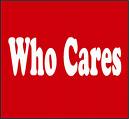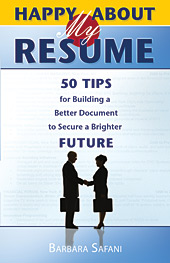
Over the years as a career professional, I’ve had clients tell me about some pretty bad resume writing advice they have received. Here are the top 5.
- List your most recent employment as current even if your employment has been terminated. This advice probably stems from the fact that people believe they are more desirable to an employer if they are currently employed. But employment dates can be checked with one phone call. Why jeopardize your credibility by showcasing inaccurate information? Honesty is still the best policy. A better strategy is to include a brief description of why you are no longer employed (i.e. downsizing, office closing, etc.)
- Omit graduation dates. Some people think that if you omit your graduation date you eliminate the chances of the reader figuring out your age. Maybe, but at the same time, leaving this information off might lead them to conclude that you are trying to hide your age and this will raise a red flag. So by leaving the dates off, you are actually calling more attention to the very thing you are trying to distract your reader from. Be transparent. Include graduation dates. If the reader truly has a bias against your candidacy because of your age, this probably isn’t the right company for you. If you are concerned about potential age bias, research the companies that embrace older workers and target those employers directly.
- Include all hobbies. A better strategy is to only include hobbies that have relevance to your job target. Most hiring authorities don’t really care if you enjoy reading and cooking. But if you have a hobby that you are passionate about that correlates to the job you are applying for, then I say go for it.
- Be sure to keep your resume to one page. Whether your resume is one page or 30 pages, no one is actually reading it. They are scanning it to quickly determine your value proposition and potential fit within their organization. Focus on making that clear on either one or two pieces of paper. Include a headline that showcases your professional identity, a profile that communicates the big picture of what you can do for an employer, an areas of expertise section that details your skills, and themed competency categories that focus on your most important accomplishments.
- Eliminate jobs you held more than 15 years ago. Most hiring authorities and recruiters in particular will want to know the whole chronology. If you have an extensive career history, focus on the past 15 years of employment and create a separate, abbreviated category for your early experience. But don’t act like that early part of your life never happened.
Thoroughly enjoying JobSnob’s feed on Twitter: What not to do if you are trying to land a new job. The most recent tweets are about resumes. You can follow her at www.twitter.com/jobsnob
 Someone reached out to me today frustrated that he had applied to multiple job postings with limited results. When this occurs, the knee-jerk reaction is to blame the resume for the lack of responses, but the resume is only effective if you have a strong search strategy to accompany the document.
Someone reached out to me today frustrated that he had applied to multiple job postings with limited results. When this occurs, the knee-jerk reaction is to blame the resume for the lack of responses, but the resume is only effective if you have a strong search strategy to accompany the document.
After further examination, I uncovered that there are 3 major flaws in this person’s posting strategy.
- Applying for positions in a geography where you do not reside. Employers are skeptical of applicants from geographies other than the one where the opportunity is. Many aren’t interested in paying relocation expenses and with so many applicants to chose from, it’s easy to eliminate someone who doesn’t reside in the same geography. If you are planning to relocate, make this clear on both your resume and cover letter so the employer knows you plan to settle down in that area. This strategy won’t guarantee that you will be considered, but it can improve your chances.
- Having less experience than the job specification requires. Hiring managers screening applicants who have responded to a job posting are generally not that flexible on this dimension. If they say that you need a minimum of 3-5 years of experience for the job and you have 2, they probably won’t pay much attention to your resume because they are bound to have dozens or even hundreds of applicants with the number of years of experience they are asking for.
- Lacking the technical expertise specified on the job posting. Again, employers who are screening applicants based on a job posting are looking for specific competencies and if they are not listed on your resume, it is easy for them to pass you over.
The bottom line is that employers who post on job boards are looking for exact matches. They are often using scanning software to screen applicants for geography, years of experience, and technical competencies. If you can’t match the majority of the requirements listed on the job spec, don’t bother applying; it’s not a good use of your time or the employer’s.
In general, the statistics around the number of people in search who land their jobs through job boards is quite low…somewhere between 2-10%. Spend only a small amount of time on the job boards and dedicate more of your time and energy to meeting people who can help you get in front of the right decision makers for your search. You want people to get to know you…the whole person; not just the resume. Once you establish a relationship with an influencer or decision maker, you can often move past the rigidity of a job spec and be considered for positions where there is not an exact match.
March 10th, 2009 |
Job Boards |
Comments Off on Does Your Resume Match the Jobs You are Posting For?
 I was recently interviewed by Heather Huhman for her Entry Level Careers Examiner column. Read my advice for how to avoid the top 4 mistakes entry level candidates make when writing their resumes here.
I was recently interviewed by Heather Huhman for her Entry Level Careers Examiner column. Read my advice for how to avoid the top 4 mistakes entry level candidates make when writing their resumes here.
March 8th, 2009 |
Uncategorized |
Comments Off on 4 Common Entry-Level Resume Mistakes and How to Avoid Them
 Over the past two weeks I attended several job fairs and critiqued hundreds of resumes. There must be a repository of really bad advice on how to write a resume out there because I tend to see the same mistakes over and over again. One of the most common mistakes I see is the use of personal attributes to describe a candidate. While personal attributes are factored in to the hiring decision, what needs to be communicated on the resume is your value proposition and proof of past successes that demonstrate that these attributes are core to your brand and personal pitch. The words themselves are meaningless unless they are backed up with facts. At these career fairs, I was reminded of a recent post by Billie Sucher over on Career Hub that discusses why personal attributes don’t prove competency. Here are a few word choices that I frequently see on resumes that unfortunately tell me nothing about you.
Over the past two weeks I attended several job fairs and critiqued hundreds of resumes. There must be a repository of really bad advice on how to write a resume out there because I tend to see the same mistakes over and over again. One of the most common mistakes I see is the use of personal attributes to describe a candidate. While personal attributes are factored in to the hiring decision, what needs to be communicated on the resume is your value proposition and proof of past successes that demonstrate that these attributes are core to your brand and personal pitch. The words themselves are meaningless unless they are backed up with facts. At these career fairs, I was reminded of a recent post by Billie Sucher over on Career Hub that discusses why personal attributes don’t prove competency. Here are a few word choices that I frequently see on resumes that unfortunately tell me nothing about you.
Dynamic- If you were so dynamic, you wouldn’t be using the word dynamic to describe yourself. Instead you would be showcasing an accomplishment that proves this quality. For example, maybe you have been able to woo difficult to land clients or you deliver engaging presentations to standing room only crowds.
Trustworthy-What does this mean exactly? That you won’t share proprietary information or you won’t steal post-its from the company’s supply closet? If you chose to put that word on your resume, there must have been a reason you selected it. Think about the success stories that prove why being trustworthy is important for the work you do and write about that instead.
Team Player-This one really makes me cringe. It’s so stale it leads me to believe that you haven’t thought about your resume since 1987. Tell me how you collaborate with others, mentor staff, recommend initiatives that make teams more cohesive…anything, but please don’t just tell me you are a team player.
Strong Communication Skills-Right. You are such a great communicator that the words alone make it true. Where’s the communications piece in this equation? Please communicate to me what you have done that proves this skill. That’s what a strong communicator does.
Happy About My Resume will be at the Monster Career Fair in NYC on 2/18 11am to 3pm offering free resume critiques. Come visit us at the Radisson Martinique Hotel, 49 West 32nd Street.
February 18th, 2009 |
Uncategorized |
Comments Off on Free Resume Critiques at the Monster Job Fair in NYC
You’ve heard it before…Most hiring managers spend less than 30 seconds looking at a candidate’s resume. How can you ensure that your resume passes the hiring authority’s initial screening and gets put in the “yes” pile? Find out on February 4, 2009 during my free teleseminar, Resumes That Pass the Hiring Manager’s 30 Second Test hosted by Liz Lynch, author of Smart Networking. During this one hour presentation attendees will learn:
- Methods for incorporating on-message keywords into the resume.
- Exciting and compelling strategies for highlighting your core brand.
- How to write accomplishment-driven, powerful content that gets noticed by hiring managers.
- Tips for leveraging the resume content to carve out your professional brand and networking strategy.
Attendees will also be eligible to receive additional free job search resources that will be announced following the teleseminar. Can’t make it? Sign up and receive the free mp3 recording. Interested? You can register here.
February 4th, 2009 |
Uncategorized |
Comments Off on Resumes That Pass the Hiring Manager’s 30 Second Test
 Yesterday I was interviewed by Krishna De on Blog Talk Radio. Given the current state of the economy, job security is on everyone’s minds and now is certainly the time to dust off and update your resume. During my interview, I discussed
Yesterday I was interviewed by Krishna De on Blog Talk Radio. Given the current state of the economy, job security is on everyone’s minds and now is certainly the time to dust off and update your resume. During my interview, I discussed
- The 5 biggest resume mistakes
- Strategies for create a compelling profile
- 3 tips for writing accomplishment statements
- The role of web resume portfolios in today’s job market
…and much, much more. You can listen to the show here.

Most resumes read like job descriptions and fail to distinguish the candidate from their competition. They are often chock full of routine tasks with no indication of the value the person brought to the job. Here are some typical statements I see on resumes.
- Generated ad hoc reports for senior management
- Typed correspondence and managed director’s calendar
- Delivered sales presentations to prospects
- Managed budgeting, financial reporting, and all accounting activities
Here’s a simple test to assess the effectiveness of your resume. Read each statement and ask yourself “so what?” In other words, ask yourself why that activity was important, how it added value to the organization, or how it helped the company make money, save money, or save time. If your original statement does not adequately answer one of those questions, it is probably too focused on job tasks and not enough on accomplishments. The best resume statements indicate impact and quantify that impact using numbers, dollars, or percentages. Remember, the job task itself is not what makes you valuable to an employer…it is your unique accomplishment within that task that will get them to sit up and take notice.
 This tops the story about Julie Sarpy’s unconventional billboard resume. Roland Burris (Blagovich’s appointment for Obama’s senate seat) has erected a mausoleum listing his accomplishments in Chicago’s Oak Woods cemetery. I guess this resume will be kept on file for quite some time.
This tops the story about Julie Sarpy’s unconventional billboard resume. Roland Burris (Blagovich’s appointment for Obama’s senate seat) has erected a mausoleum listing his accomplishments in Chicago’s Oak Woods cemetery. I guess this resume will be kept on file for quite some time.
January 9th, 2009 |
Just for Fun |
Comments Off on A Resume That’s Set in Stone…Literally


 Someone reached out to me today frustrated that he had applied to multiple job postings with limited results. When this occurs, the knee-jerk reaction is to blame the resume for the lack of responses, but the resume is only effective if you have a strong search strategy to accompany the document.
Someone reached out to me today frustrated that he had applied to multiple job postings with limited results. When this occurs, the knee-jerk reaction is to blame the resume for the lack of responses, but the resume is only effective if you have a strong search strategy to accompany the document. I was recently interviewed by Heather Huhman for her Entry Level Careers Examiner column. Read my advice for how to avoid the top 4 mistakes entry level candidates make when writing their resumes
I was recently interviewed by Heather Huhman for her Entry Level Careers Examiner column. Read my advice for how to avoid the top 4 mistakes entry level candidates make when writing their resumes  Over the past two weeks I attended
Over the past two weeks I attended 

 Yesterday I was interviewed by
Yesterday I was interviewed by 
 This tops the story about Julie Sarpy’s unconventional billboard
This tops the story about Julie Sarpy’s unconventional billboard 